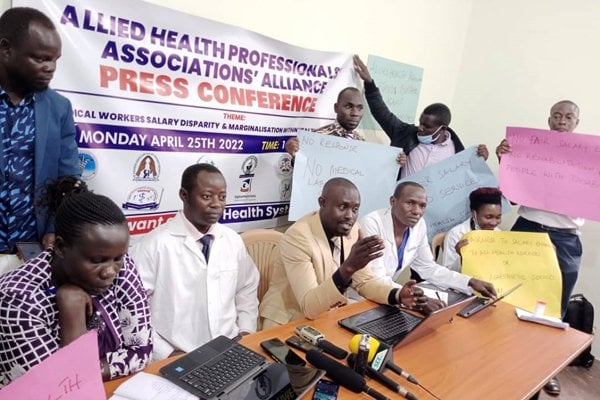Prime
WHO requests govt to intervene in medical workers’ strike

Allied health professionals, including members of Uganda Association for Orthopedic Technologists and Uganda Medical Laboratory Technology Association, during a press conference in Kampala on April 25. PHOTO / TONNY ABET
What you need to know:
- About 30,000 allied health professionals, who comprise medical clinical officers, clinical psychiatrists, laboratory scientists, radiographers, records officers, and dental technicians went on strike on May 16 over low pay and poor working conditions.
The World Health Organisation has asked the government to intervene in the strike by medical workers, warning that it is reversing gains in improving quality of care and reducing preventable deaths.
About 30,000 allied health professionals, who comprise medical clinical officers, clinical psychiatrists, laboratory scientists, radiographers, records officers, and dental technicians went on strike on May 16 over low pay and poor working conditions.
Speaking to journalists in Kampala yesterday, Dr Olive Sentumbwe, the WHO family, health and population adviser, said mothers and children are some of the most affected.
“Anybody striking will affect the quality of healthcare, and so there needs to be adequate investment in terms of motivation, training, accommodating and payment of salaries and emoluments of various nature to make sure that health workers are on duty. You can’t work on one area without the other,” she said.
Dr Sentumbwe added: “When health workers stop working, they affect us in maternal healthcare. The litmus paper of the healthcare system is us, the mothers and newborns.”
The Ministry of Health is grappling with reducing maternal deaths from 336 per 100,000 births to 70 per 100,000 births by 2030.
It also intends to reduce newborn deaths from 27 per 1,000 live births to 12 per 1,000 live births within the same time period.
Leaders of some hospitals said they are asking students who are training in their facilities to bridge the staffing gap.
Dr Joseph Okware, the director of health governance and regulation at the Ministry of Health, and Mr Abbey Ssevume Kauma, a leader in Uganda Orthopaedic Association, said engaging students affects the quality of care.
However, Mr Emmanuel Ainebyoona, the Health ministry spokesperson, urged the allied health professionals to resume work as the ministry engages with other government offices to address their grievances.
Mr Ssevume told this newspaper that they are now planning to withdraw the emergency services they have been providing in the industrial action.
“This means anyone who needs blood transfusion will not be able to get the service because you cannot be transfused without knowing the type of blood you are compatible with. This is done by lab scientists who are on strike,” Mr Ssevume said.
He said even those who need operations will not be anaesthetised because those who do the work are from allied health professionals.
Mr Denis Alibu, who is leading the striking professionals, said earlier that in the recently announced salary enhancement, government apportioned a big percentage of money to scales U4, U3, U2 and U1, giving minimal consideration for U5, U6, U7 and U8, where the majority of the allied health workforce belongs but Public Service said the final salary structure is yet to be announced.




